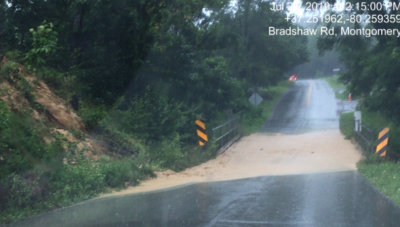
Muddy water from the MVP mainline construction runs off onto a Montgomery County, Va. road in July 2019. Photo courtesy Mountain Valley Watch
By Penina Harte, Appalachian Voices Virginia Program Assistant, Summer 2019
The Mountain Valley Pipeline Southgate pipeline would be a 73-mile extension of the 300-mile Mountain Valley Pipeline (MVP) from Chatham, Virginia, where the mainline ends and connects to the Transco Pipeline, to Graham, North Carolina. It would be between 16 and 24 inches in diameter, depending on the location.
In July, the Federal Energy Regulatory Commission (FERC) issued a Draft Environmental Impact Statement ) for the project, stating it would result in “some adverse environmental impacts,” but that these impacts would be limited through implementation of FERC’s recommendations.
Urgent action needed. Help stop the Mountain Valley Pipeline Southgate extension today!
As demonstrated by construction activities along the MVP mainline however, these environmental standards consistently prove inadequate, as the builder fails to comply with permit conditions and water quality violations continue to amass. While the requirement for an Environmental Impact Statement and the opportunity for public input exist to improve environmental decision-making, FERC has rejected only two pipeline applications out of approximately 400 over the last two decades.
This project is not even needed to meet current and future customer demand. In a recent report, the Applied Economics Clinic (AEC) found that the gas demand projections used to support the project are faulty, concluding that “MVP LLC has not provided convincing evidence of a need for MVP Southgate.”
These early stories of MVP Southgate feel all too familiar to those who have fought the Mountain Valley Pipeline since its initial proposal in 2014. FERC approved MVP’s Certificate of Public Convenience and Necessity in 2017, despite thousands of public comments requesting that the agency reject the application. Construction began in spring of 2018, and developers have accrued over 300 water quality violations in Virginia, and dozens more in West Virginia—a majority of those violations documented by citizen monitors.
Although a portion of MVP construction has been completed, much work remains, and it still faces major setbacks including a lack of key federal permits, construction delays, heightened costs, lawsuits and vast citizen resistance to construction. A recent legal challenge to the pipeline’s Endangered Species Act permit drove the company to suspend certain construction activities and FERC to re-examine whether the project complies with the law (Appalachian Voices is a party to this legal challenge).
Communities, organizations and individuals have fought this harmful project every step of the way and are prepared to do the same for the proposed MVP Southgate pipeline.
The time is now for people to engage and oppose MVP’s unnecessary extension. Citizens can submit comments on FERC’s Draft Environmental Impact Statement for through September 16. Sign on to Appalachian Voices’ comment to FERC now to express your opposition to the project.
If you would like to submit your own comment on the Southgate extension, you can do so electronically on FERC’s website using the eComment feature under the Documents and Filings link. Docket No. CP19-14-000.



Leave a Reply